This Mother’s Day, honor the incredible women who’ve shaped our lives by delving into stories of mothers from different walks of life and mothers who parent from various points of view.
Explore our selections and Happy Mother’s Day!
A Kid Like Jake by
On the eve of the admissions cycle for Manhattan’s most exclusive private schools, Alex and Greg have high hopes for their son Jake, a precocious four-year-old who happens to prefer Cinderella to G.I. Joe. But as the process continues, Jake’s behavior becomes erratic and perplexing, and other adults in his life start to wonder whether his fondness for dress-up might be cause for concern. The story of a husband and wife struggling to do right by their son, A Kid Like Jake is a study of intimacy and parenthood and the fantasies that accompany both.
The Mother by Florian Zeller, translated by Christopher Hampton
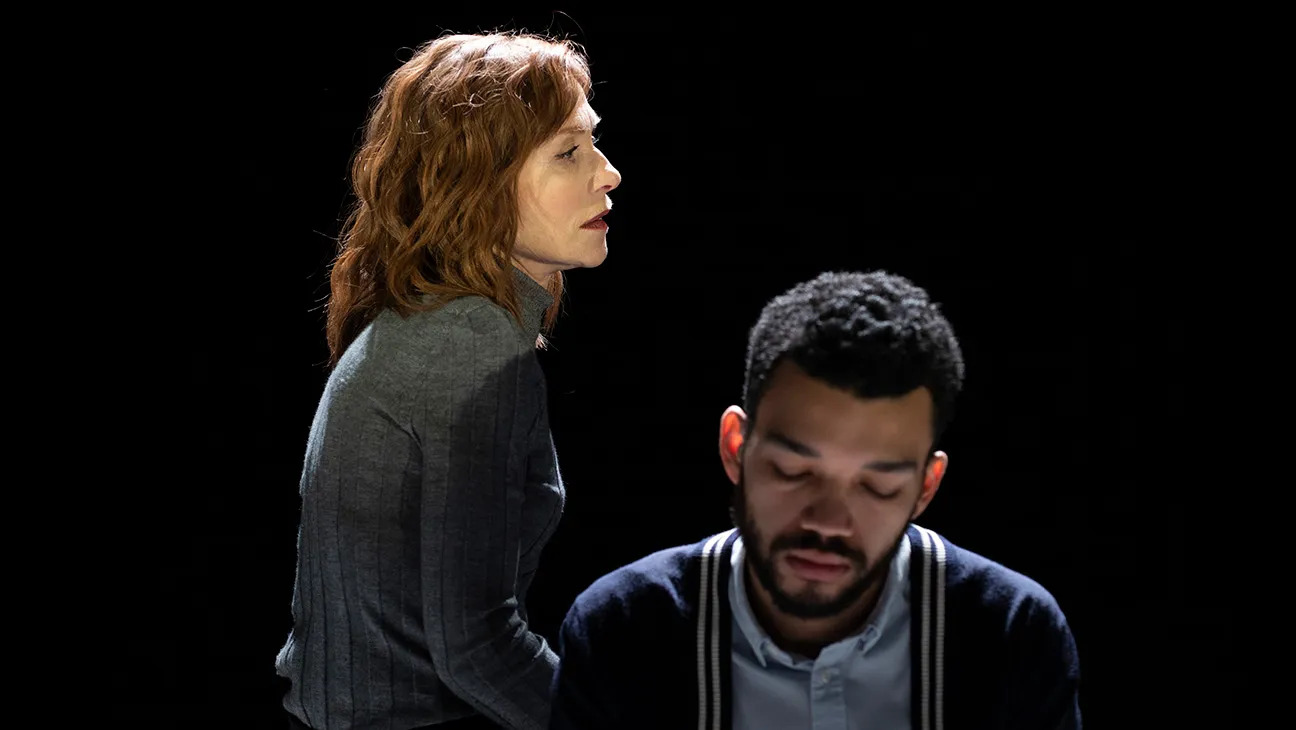
Photo by Ahron R. Foster, 2019 Off-Broadway Production
Anne’s adult children are off living their own lives and her husband is busy with his career. So where does that leave Anne, who has built her identity around creating a family and being a good mother? On the night before her husband is set to leave on a business trip, her son comes home to sleep in his old room. Or does he? It’s impossible to know for certain in this riveting play about a woman whose inner life is constantly shifting.
Stupid Fucking Bird by
An aspiring young director rampages against the art created by his mother’s generation. A nubile young actress wrestles with an aging Hollywood star for the affections of a renowned novelist. And everyone discovers just how disappointing love, art, and growing up can be. In this irreverent, contemporary, and very funny remix of Chekhov’s The Seagull, Aaron Posner stages a timeless battle between young and old, past and present, in search of the true meaning of it all. Original songs composed by James Sugg draw the famously subtextual inner thoughts of Chekhov’s characters explicitly to the surface. Stupid Fucking Bird will tickle, tantalize, and incite you to consider how art, love, and revolution fuel your own pursuit of happiness.
Jar the Floor by
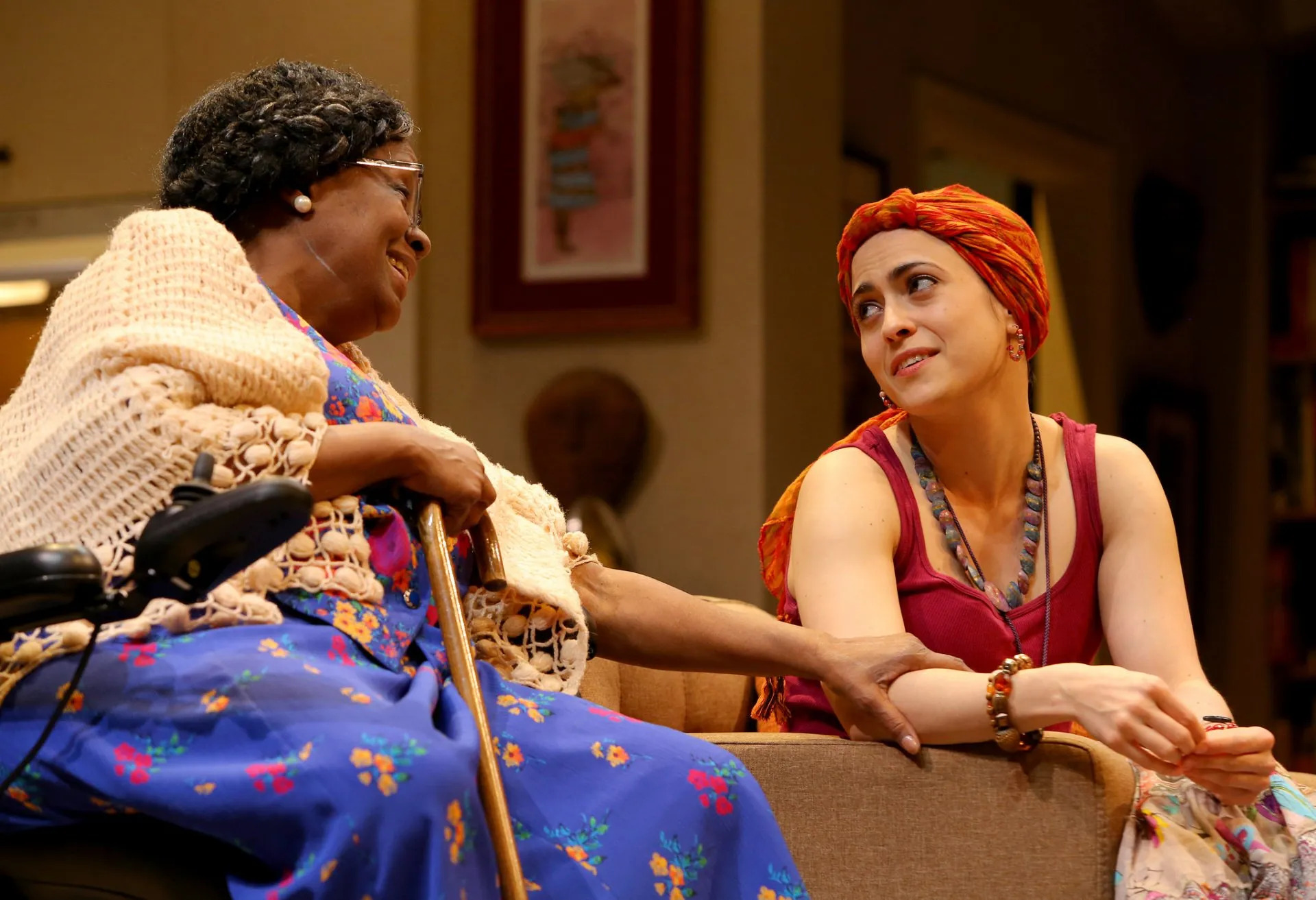
Photo by Stephen B. Thorton, 2017 Arkansas Repertory Theatre Production
A quartet of black women spanning four generations makes up this heartwarming dramatic comedy. The four, plus the white woman friend of the youngest, come together to celebrate the matriarch’s ninetieth birthday. It’s a wild party, one that is a lovable lunatic glance at the exhilarating challenge of growing old amidst the exasperating trials of growing up.
Included in Broadway Book Club’s Women’s Voices Specialty Collection
Auntie Mame by Jerome Lawrence and Robert E. Lee
This fabulously successful hit hardly needs introduction. Besides being the source for one of America’s most popular musicals, Auntie Mame set a standard for Broadway comedy that’s been sought after ever since. “Auntie Mame was a handsome, sparkling, scatterbrained and warm-hearted lady who brightened the American landscape from 1928 to the immediate past by her whimsical gaiety, her slightly madcap adventures and her devotion to her young nephew, who grew up to be Patrick Dennis. Through fortunes that rose and fell and a pleasant but brief marriage to a likable Southerner, who had the bad luck to tumble down from the Matterhorn, Auntie Mame’s chief concern was that nephew, whom she raised…[the play’s] central figure is a woman of spirit, innate kindness and undefeatable courage…” —New York Post.
The Assembled Parties by
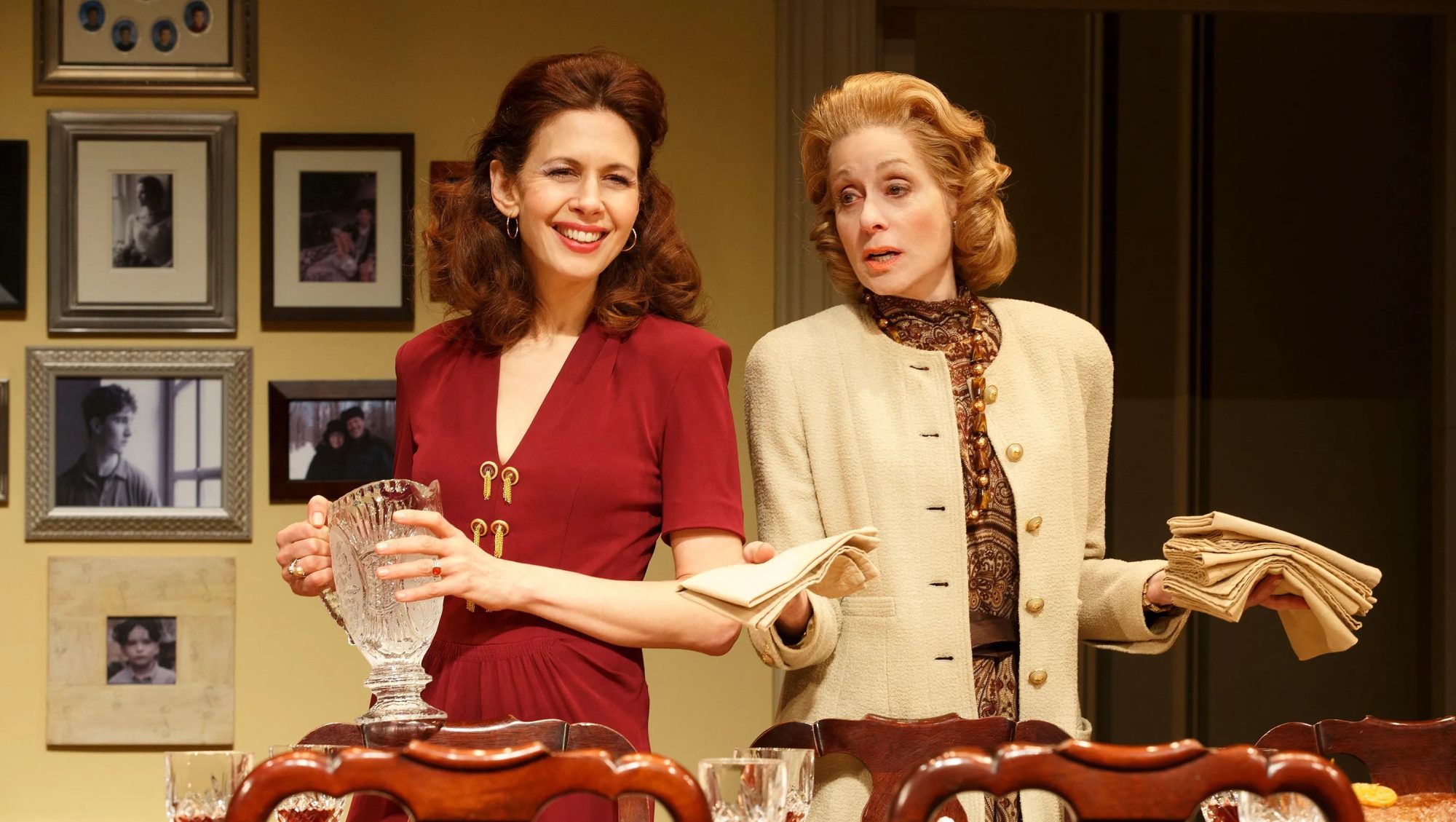
Photo by Joan Marcus, 2013 Broadway Production
The Assembled Parties welcomes us to the world of the Bascovs, an Upper West Side Jewish family in 1980. In a sprawling Central Park West apartment, former movie star Julie Bascov and her sister-in-law Faye bring their families together for their traditional holiday dinner. But tonight, things are not usual. A houseguest has joined the festivities for the first time and he unwittingly—or perhaps by design—insinuates himself into the family drama. Twenty years later, as 2001 approaches, the Bascovs’ seemingly picture-perfect life may be about to crumble. A stunning play infused with humor, The Assembled Parties is an incisive portrait of a family grasping for stability at the dawn of a new millennium.
Our Mother’s Brief Affair by
On the verge of death for the umpteenth time, Anna makes a shocking confession to her grown children: an affair from her past that just might have resonance beyond the family. But how much of what she says is true? While her children try to separate fact from fiction, Anna fights for a legacy she can be proud of. With razor-sharp wit and extraordinary insight, Our Mother’s Brief Affair considers the sweeping, surprising impact of indiscretions both large and small.
Sweet Sue by
The action of the play is set in Susan’s home in a New York suburb—Susan being a romantically-minded, divorced mother of three, and a very successful artist and designer of greeting cards. It is summer and Jake, the Dartmouth roommate of her son, Ted, has taken up temporary residence with Susan while doing house painting to earn money for his college expenses. Susan is drawn to the handsome, lively Jake, while he, in turn, is hopeful of finally establishing a meaningful relationship with a member of the opposite sex—although what he has in mind is someone of his own age. But, as the two begin to draw closer to each other, what adds a special quality to their relationship is that Susan is played by two actresses and Jake by two actors—offering two distinct perspectives on both characters and allowing the playwright to conceive a wide array of clever and inventive combinations and situations. Susan (and Susan Too) wants Jake (and Jake Too) to pose in the nude for a life study, and while there is initial reluctance, Jake (both of him) finally acquiesces, leading to the bittersweet ending of the play in which desire and convention are both touchingly accommodated before Susan and Jake return, as they know they must, to their separate worlds.
The Lyons by
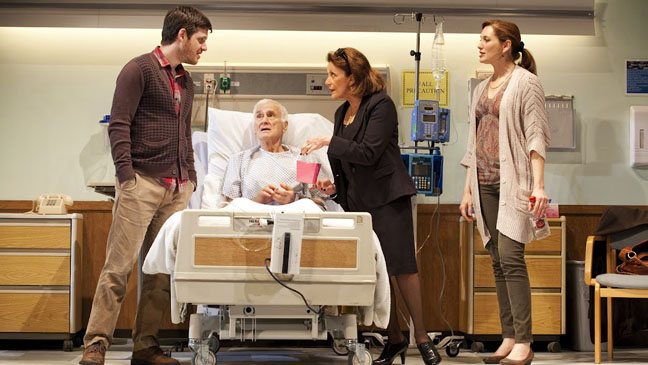
Photo by Carol Rosegg, 2012 Off-Broadway Production
The Lyons starts in a hospital room. As Ben Lyons lies dying, his wife of forty years, Rita, flips through decorating magazines, planning a living room make-over. “I know you won’t actually be there to enjoy it, but I’d like to think you’d like it.” It’s clear Ben and Rita have been at war for many years, and that Ben’s impending demise has brought no relief. When they’re joined by their children, Lisa and Curtis, all efforts at a pleasant visit or a sentimental goodbye to the dying patriarch are soon abandoned. Terrible secrets and vicious accusations replace sentimental memories.
In Act Two we follow Curtis. His desperate attempt to make a new connection ends so disastrously that the remaining Lyons are reunited at the hospital. We watch as each of them take the first tentative steps toward new human connection.
August: Osage County by
Recipient of the 2008 Tony Award® for Best Play and winner of the Pulitzer Prize for Drama
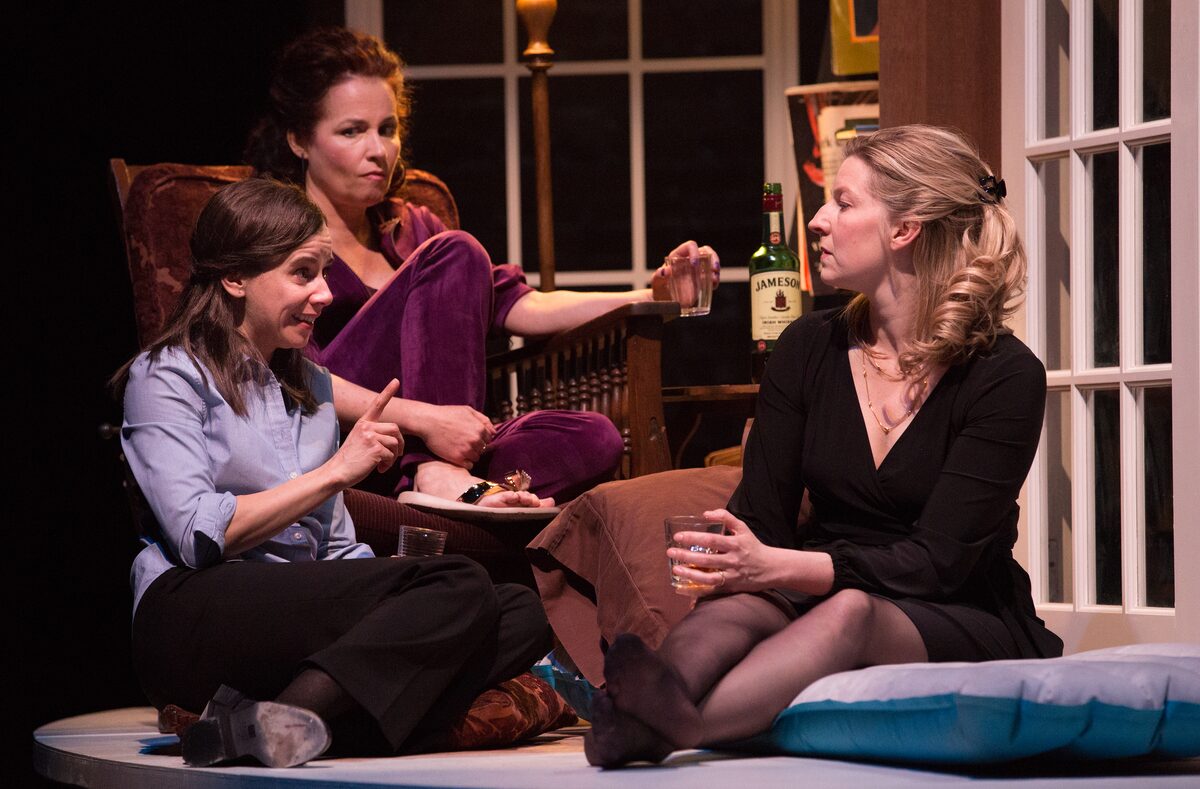
Photo by Cylla von Tiedemann, 2019 Soulpepper Theatre Production
A vanished father. A pill-popping mother. Three sisters harboring shady little secrets. When the large Weston family unexpectedly reunites after Dad disappears, their Oklahoman family homestead explodes in a maelstrom of repressed truths and unsettling secrets. Mix in Violet, the drugged-up, scathingly acidic matriarch, and you’ve got a major play that unflinchingly—and uproariously—exposes the dark side of the Midwestern American family.
Electricidad by
In the years following the murder of her father by her mother, Electricidad is committed to vengeance. To get it, she’ll need her brother, Orestes, to return from Las Vegas and help her finish the job. Transporting Sophocles’ Electra to the Los Angeles barrios, Luis Alfaro investigates violence, loss, and redemption through the lens of this age-old tragedy.
A Doll’s House by Henrik Ibsen, adapted by Frank McGuinness
Nora Helmer is a vibrant young housewife who nonetheless suffers from a crippling dependency on her husband of eight years. He, Torvald, has always done the thinking for the both of them. In order to save Torvald from a debt, and to spare his masculine pride, Nora arranges a loan without his knowledge, and does so by forging a signature. The inevitable revelation of the crime results in an unexpected reaction from Torvald: Rather than being grateful to Nora, he is incapable of accepting the pride and self-sufficiency she demonstrated in taking care of him, and he accuses her of damaging his good name. The illusions behind their marriage are exposed, and Nora wakes to feelings of self awareness for the first time in her life. Torvald is not the man she thought she knew. They are husband and wife, yes, but they are strangers as well. And in one of the most famous, and scandalous, climaxes in all of nineteenth-century drama, Nora leaves her husband and children, determined to forge a new identity from the one she has always known.
Morning Sun by
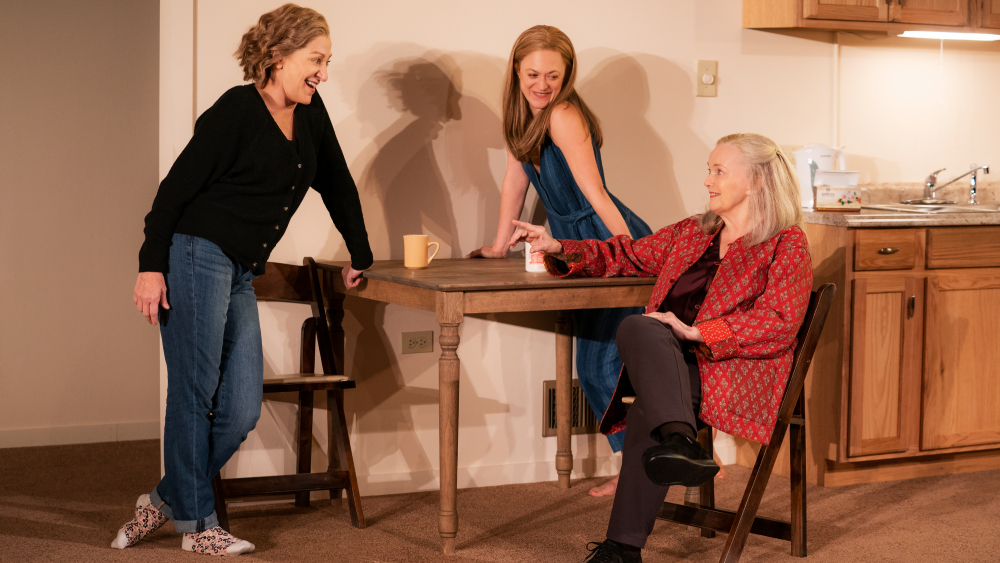
Photo by Matthew Murphy, 2021 Off-Broadway Production
In Greenwich Village a generation or so ago, the city is alive. Joni Mitchell sings, friends and lovers come and go, and the regulars change at the White Horse Tavern. As fifty years pass, one woman’s life is revealed in all its complexity, mystery, and possibility in this enthralling piece about mothers and daughters.
Grey Gardens—book by Doug Wright, music by Scott Frankel, lyrics by Michael Korie
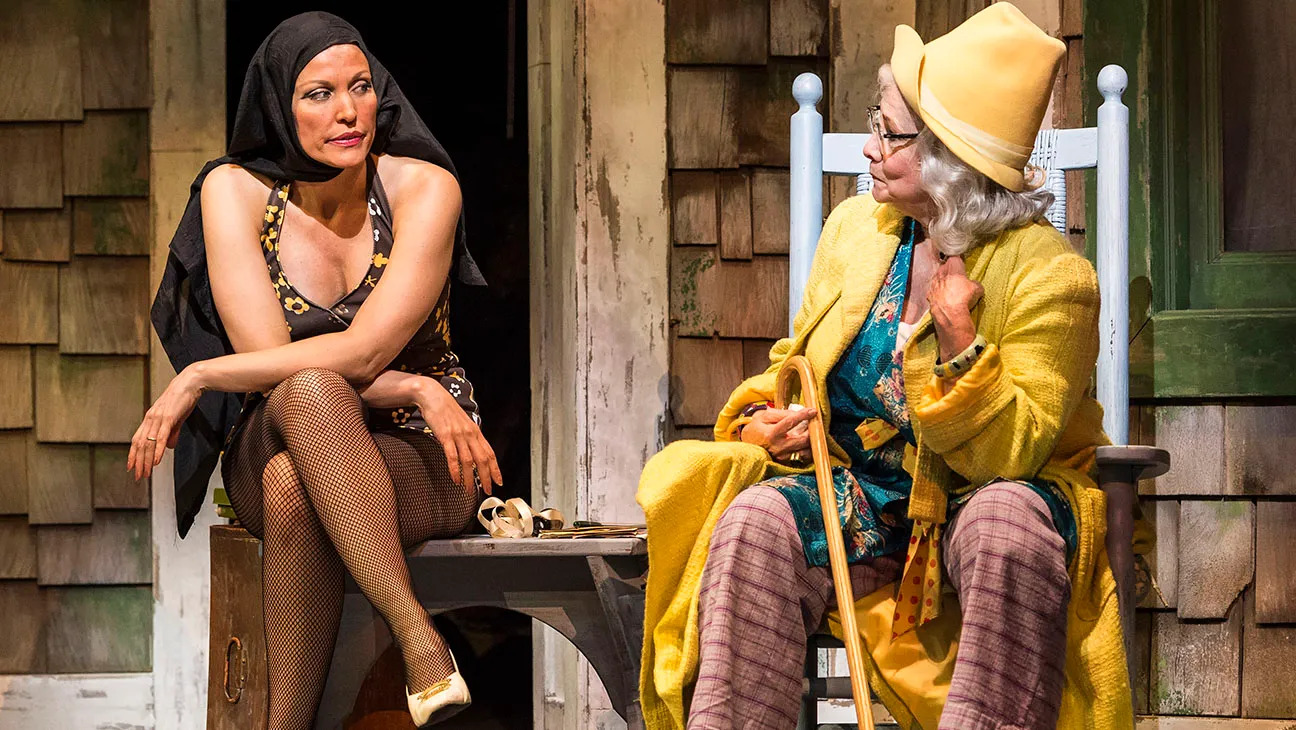
Photo by Craig Schwartz, 2016 Ahmanson Theatre Production
The hilarious and heartbreaking story of Big Edie and Little Edie Bouvier Beale, the eccentric aunt and cousin of Jacqueline Kennedy Onassis, once bright names on the social register who became East Hampton’s most notorious recluses.
The Glass Menagerie by
Amanda Wingfield is a faded remnant of Southern gentility who now lives in a dingy St. Louis apartment with her son, Tom, and her daughter, Laura, who has a physical handicap and debilitating shyness. The father has left home; Tom supports his mother and sister with a shoe-factory job he finds unbearable. When Amanda convinces Tom to bring home from his workplace a “gentleman caller” for Laura, the illusions that Tom, Amanda, and Laura have each created in order to make life bearable collapse about them.
Chicken & Biscuits by
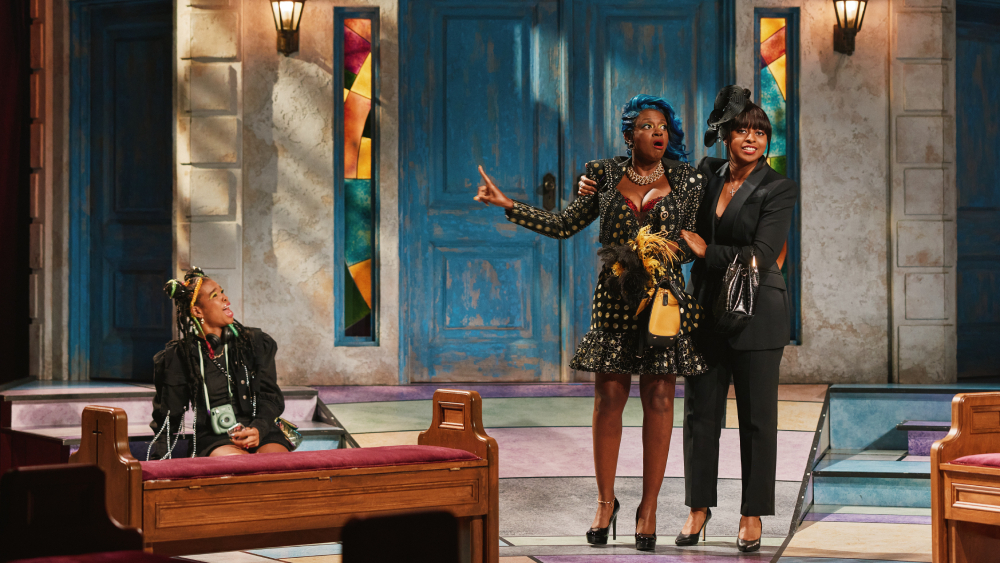
Photo by Emilio Madrid, 2021 Broadway Production
Can rivaling sisters Baneatta and Beverly bury their father without killing each other? This proves difficult when Beverly shows up to the chapel with her “blessings” on display. Meanwhile, Baneatta’s son brings his neurotic Jewish boyfriend along, knowing Baneatta disapproves, and Beverly’s nosy daughter keeps asking questions no one wants to answer. Baneatta’s pastor husband tries to mediate the family drama, but when a shocking family secret reveals itself at the pulpit, the two sisters are faced with a truth that could either heal or break them.
Mama Won’t Fly by
An outrageously hilarious race against the clock begins when Savannah Sprunt Fairchild Honeycutt agrees to get her feisty mother all the way from Alabama to California in time for her brother’s wedding. Savannah’s problem: Mama won’t fly. With only four days to make it to the ceremony, this determined daughter has no choice but to drive cross-country with her equally willful mother, Norleen Sprunt, in Mama’s vintage sedan. As Savannah steels herself for this hastily conceived road trip, another outrageous complication arises: the bubbly, over-eager bride-to-be arrives unannounced. Hayley Quinn, delighted to finally meet her future in-laws, is convinced that travelling together to her wedding is the perfect way to bond. The folly of her decision quickly becomes apparent when the journey begins and comedic chaos ensues. Every conceivable—and inconceivable—mishap that can occur does, including the theft of their car and all their clothes, a near-fatal encounter at an underwear museum, the accidental homicide of an ancient Texas relative, a mad dash across the desert in a hijacked eighteen-wheeler and a riotous detour to Vegas that ends in a brawl with an ordained showgirl/minister. As the misadventures multiply, the beleaguered trio rapidly develops the urge to ditch each other anywhere along the way. Eventually the race to get to the church on time takes its toll and the overwhelmed bride calls off the wedding. Rising above their age-old mother-daughter issues, Norleen and Savannah work together to get the nuptials back on track. In a surprising and heartwarming resolution, they forge an exciting new path for their own relationship and welcome Hayley into their delightfully wacky family. This ferociously funny, family-friendly Jones-Hope-Wooten comedy will have you laughing your way across the country and all the way down the aisle!
The Women of Lockerbie by
A mother from New Jersey roams the hills of Lockerbie, Scotland, looking for her son’s remains that were lost in the crash of Pan Am 103. She meets the women of Lockerbie, who are fighting the U.S. government to obtain the clothing of the victims found in the plane’s wreckage. The women, determined to convert an act of hatred into an act of love, want to wash the clothes of the dead and return them to the victim’s families. The Women of Lockerbie is loosely inspired by a true story, although the characters and situations in the play are purely fictional. Written in the structure of a Greek tragedy, it is a poetic drama about the triumph of love over hate.





